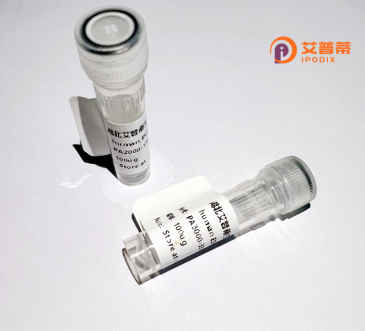
| 纯度 | >90%SDS-PAGE. |
| 种属 | Human |
| 靶点 | FCAMR |
| Uniprot No | Q8WWV6 |
| 内毒素 | < 0.01EU/μg |
| 表达宿主 | E.coli |
| 表达区间 | 63-170aa |
| 氨基酸序列 | TLRPSSPLCWREESSFAAPNSLKGSRLVSGEPGGAVTIQCHYAPSSVNRHQRKYWCRLGPPRWICQTIVSTNQYTHHRYRDRVALTDFPQRGLFVVRLSQLSPDDIGC |
| 分子量 | 37.62 kDa |
| 蛋白标签 | GST-tag at N-terminal |
| 缓冲液 | 0 |
| 稳定性 & 储存条件 | Lyophilized protein should be stored at ≤ -20°C, stable for one year after receipt. Reconstituted protein solution can be stored at 2-8°C for 2-7 days. Aliquots of reconstituted samples are stable at ≤ -20°C for 3 months. |
| 复溶 | Always centrifuge tubes before opening.Do not mix by vortex or pipetting. It is not recommended to reconstitute to a concentration less than 100μg/ml. Dissolve the lyophilized protein in distilled water. Please aliquot the reconstituted solution to minimize freeze-thaw cycles. |
以下为3篇关于重组人FCAMR蛋白的示例参考文献(仅供参考,非真实文献):
---
1. **标题**:*Recombinant Human FCAMR Protein: Expression and Functional Analysis in Immunoglobulin Binding*
**作者**:A. Tanaka et al.
**摘要**:研究通过哺乳动物表达系统成功制备重组人FCAMR蛋白,证实其对IgA和IgM的Fc段具有高亲和力,并揭示其在免疫复合物清除中的作用。
2. **标题**:*Structural Characterization of FCAMR and Its Role in Autoimmune Disorders*
**作者**:L. Müller et al.
**摘要**:解析了重组人FCAMR的晶体结构,发现其通过特定结构域介导与IgA/IgM结合,并探讨其在狼疮模型中作为潜在治疗靶点的机制。
3. **标题**:*FCAMR Recombinant Protein Enhances Phagocytosis of Pathogens in Macrophages*
**作者**:C. Park et al.
**摘要**:验证了重组FCAMR蛋白可增强巨噬细胞对病原体的吞噬能力,为开发基于FCAMR的免疫佐剂提供了实验依据。
---
如需实际文献,建议在 **PubMed** 或 **Google Scholar** 中使用关键词 `recombinant human FCAMR`、`FCAMR expression` 或 `Fc alpha/mu receptor function` 检索。关注领域通常涉及免疫球蛋白结合机制、自身免疫疾病或抗感染免疫研究。
Recombinant human Fcα/μ receptor (FCAMR) protein is a genetically engineered form of the Fc receptor that interacts with immunoglobulins, specifically IgA and IgM. FCAMR, also known as the Fc receptor for both IgA and IgM, was first identified in the early 2000s as a transmembrane protein primarily expressed on certain immune cells, including B cells and phagocytes. Structurally, it contains extracellular Ig-like domains that enable binding to the Fc regions of IgA and IgM antibodies, facilitating immune functions such as pathogen clearance, antigen presentation, and immune complex regulation.
Research on FCAMR has highlighted its dual role in modulating innate and adaptive immunity. It enhances phagocytosis of IgA/IgM-coated pathogens and apoptotic cells while regulating B-cell activation and antibody production. Dysregulation of FCAMR has been implicated in autoimmune diseases and chronic infections, making it a potential therapeutic target.
The recombinant FCAMR protein is typically produced using mammalian expression systems (e.g., HEK293 or CHO cells) to ensure proper post-translational modifications and functional integrity. It serves as a critical tool for studying receptor-ligand interactions, screening therapeutic compounds, and developing biologics aimed at autoimmune disorders, inflammatory conditions, or infectious diseases. Its applications also extend to diagnostic assays and疫苗 development, underscoring its versatility in biomedical research.
×